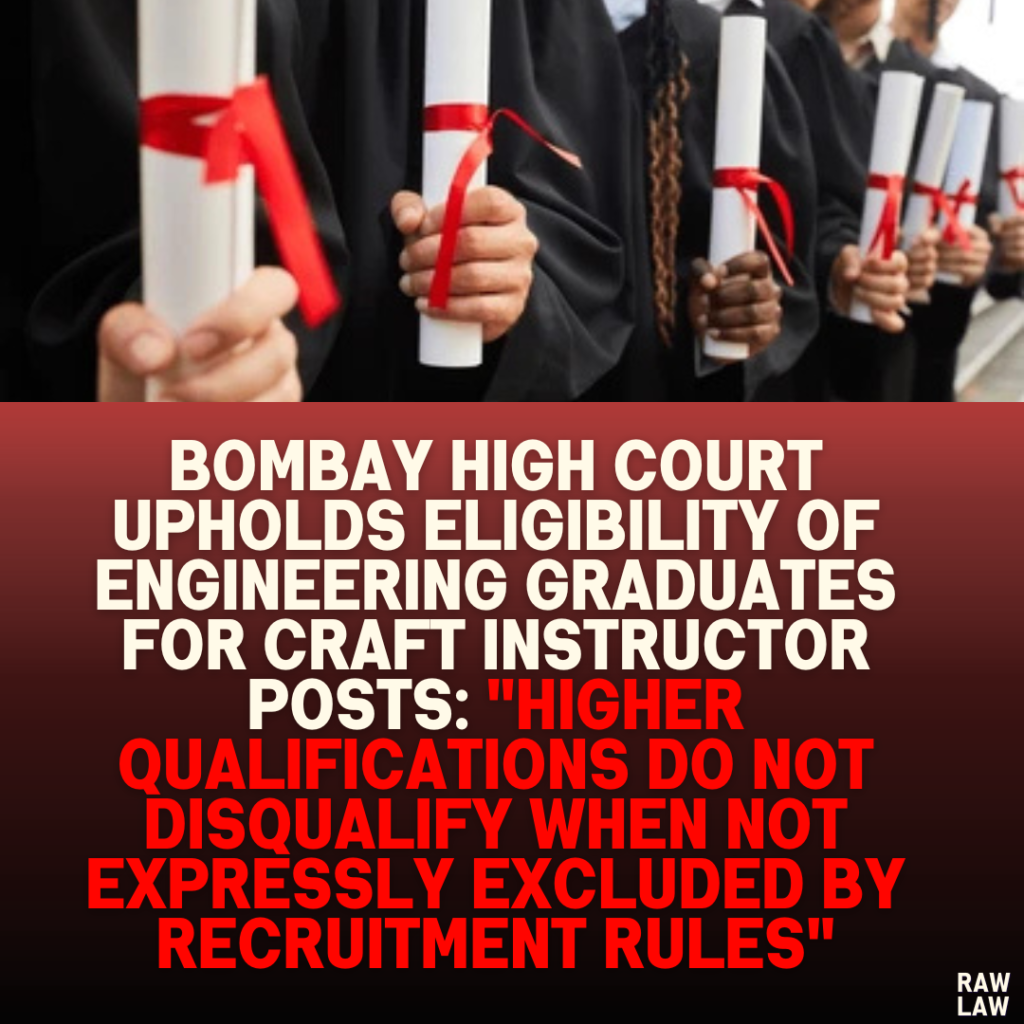Court’s Decision
The Bombay High Court dismissed two writ petitions challenging the recruitment process for Craft Instructor posts in Industrial Training Institutes (ITIs). The court upheld the validity of the Maharashtra Administrative Tribunal’s decision, which found no illegality in permitting engineering graduates to apply for the posts under the Recruitment Rules of 1983. The court stated, “There is no error or illegality in the order of the Tribunal under challenge. It has taken a plausible view, which cannot be disturbed in exercise of the powers under Article 226 of the Constitution of India.”
Facts
- The Directorate of Vocational Education and Training (DVET) issued an advertisement dated August 17, 2022, for filling 1,457 Craft Instructor posts across various trades in ITIs. The advertisement specified educational qualifications as per the Recruitment Rules of 1983.
- Clause 8.1 of the advertisement stipulated that candidates with higher qualifications, such as a Bachelor’s degree in Engineering (B.E.), were eligible for the posts.
- The petitioners contended that the rule diluted the essential requirement of a diploma in the respective trade and contravened the Recruitment Rules of 1983.
- Petitioners participated in the recruitment process but challenged the eligibility criteria after the selection process was underway.
Issues
- Did the Recruitment Rules of 1983 mandate a diploma as the sole qualification, thereby excluding engineering graduates?
- Was the Tribunal correct in upholding the selection process under Clause 8.1 of the advertisement?
- Could the petitioners challenge the recruitment process after participating without raising objections initially?
Petitioner’s Arguments
- Essential Qualification: The Recruitment Rules of 1983 prescribe a diploma in the respective trade as an essential qualification, and this cannot be substituted by higher qualifications.
- Dilution of Standards: Clause 8.1 of the advertisement diluted the rules and allowed ineligible candidates (engineering graduates without diplomas) to apply.
- Inconsistent Application of Rules: Higher qualifications, such as B.E., do not necessarily encompass the practical knowledge imparted through a diploma.
- Retroactive Changes: The new recruitment rules, effective July 10, 2024, clarified the diploma as a “minimum qualification,” indicating a tacit admission by the government that earlier rules required this specific qualification.
- Precedents: They cited judgments like Milind Shantilal Rathod v. State of Maharashtra and Sangram Ramdas Gholve v. State of Maharashtra, where courts upheld strict adherence to prescribed qualifications.
Respondent’s Arguments
- Compliance with Rules: Clause 8.1 was consistent with the Recruitment Rules of 1983, which did not explicitly exclude candidates with higher qualifications.
- Higher Qualification Presupposition: Higher qualifications, such as a B.E., presuppose the acquisition of the lower qualifications (diploma).
- Estoppel: The petitioners participated in the recruitment process without raising objections and are thus barred from challenging the rules at this stage.
- Policy Decision: Determining qualifications is a matter of policy, and the government has discretion to consider higher qualifications as suitable.
- Precedents: They relied on cases like Jyoti K.K. v. Kerala Public Service Commission and Puneet Sharma v. Himachal Pradesh State Electricity Board Ltd., which held that higher qualifications cannot be treated as a disqualification unless expressly excluded by the rules.
Analysis of the Law
- Recruitment Rules of 1983:
- Rule 3 of the Recruitment Rules of 1983 prescribes a diploma in the respective trade but does not explicitly state it as the sole or minimum qualification.
- The court emphasized that the rules do not exclude candidates with higher qualifications.
- Higher Qualification Doctrine:
- In Jyoti K.K. (2010), the Supreme Court held that higher qualifications presuppose the acquisition of lower qualifications unless specifically excluded.
- Applying this doctrine, the court held that a B.E. degree in a trade is higher than a diploma and presupposes its acquisition.
- Precedent Analysis:
- The court distinguished Milind Shantilal Rathod and Sangram Ramdas Gholve, where recruitment rules expressly excluded higher qualifications, from the current case where no such exclusion existed.
- The decision in Puneet Sharma (2021) was cited to establish that higher qualifications in engineering are deemed sufficient for eligibility when the rules do not expressly bar them.
- Participation and Estoppel:
- The court relied on the estoppel principle, barring candidates from challenging recruitment processes after voluntarily participating without objection, as held in cases like State of Uttar Pradesh v. Karunesh Kumar.
Court’s Reasoning
- Clarity in Rules: The court found that the Recruitment Rules of 1983 neither mandated a diploma as the sole qualification nor excluded candidates with higher qualifications.
- Intent of Clause 8.1: Clause 8.1 clarified that candidates with higher qualifications were eligible, aligning with the rules and legal precedents.
- Practical Implications: The court noted that no evidence was provided to show that a diploma imparted skills unavailable in a B.E. program for the same trade.
- Estoppel and Delay: The petitioners’ participation in the recruitment process without objection and their delayed challenge undermined their case.
- Non-retroactive Application of New Rules: The new recruitment rules effective from July 10, 2024, could not retroactively apply to the ongoing process.
Conclusion
The court dismissed the petitions, affirming that:
- Engineering graduates with degrees in relevant trades were eligible for the posts under Clause 8.1 of the advertisement.
- The Tribunal’s decision was legally sound and based on established principles.
- Petitioners’ delayed challenge and participation estopped them from objecting to the recruitment process.
The court concluded, “Possessing higher qualifications does not disqualify candidates when not expressly excluded by the rules.”
Implications
- Recruitment Policies: The judgment reinforces the government’s discretion in defining qualifications for public posts and sets a precedent for interpreting similar recruitment rules.
- Future Challenges: Candidates must challenge recruitment advertisements promptly, or they risk being estopped from objecting after participating.
- Rule Clarifications: The case highlights the importance of drafting clear recruitment rules to avoid ambiguities and litigation.
